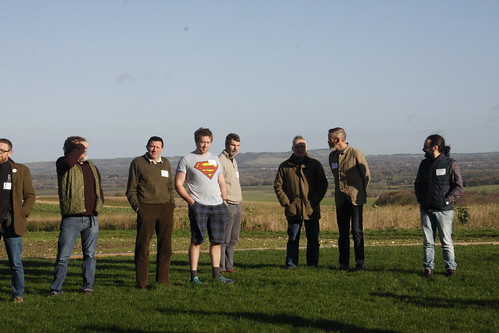
The Organic Research Centre, a leading independent research charity, is inviting UK farmers to participate in a new EU-funded project called DIVERSify which is investigating how to maximise the performance of crop mixtures (or plant teams) to improve yields while reducing the reliance on inputs.
Dr Bruce Pearce from the Organic Research Centre said, “It is estimated that we will need a 70% growth in food production by 2050 to feed the rapidly increasing global population. Although crop yields increased post 1950 through agricultural advances and farming inputs, these are now starting to plateau.”
With this in mind, a new EU-funded project called DIVERSify has been established to investigate the design of innovative mixtures of crop species to improve the performance of crop yields while reducing pest and disease damage. The project consortium of 23 EU and International partners is co-ordinated in the UK by the James Hutton Institute. Other UK partners are the Organic Research Centre (ORC), Stockbridge Technology Centre (STC) and Linking Environment and Farming (LEAF).
Intercropping with plant teams is the concept of growing two or more crops together in the same space and time, such as growing a barley with a pea mixture or winter beans with wheat or undersowing a combinable crop with clover mixtures. These plant teams can interact in a way that increases their fitness and yield and they become beneficial to each other rather than competing for resources.
Intercropping of compatible plants encourages biodiversity by providing a habitat for a variety of insects and soil organisms that would not be present in a single crop. This not only improves soil quality, yields and farm income it also reduces the need for pesticides and fertilisers.
Bruce Pearce explains, “We are now facing increased pressure and challenges to grow crops more sustainably with fewer inputs, while ensuring that crop production comes with minimum environmental damage. There could be huge benefits to be gained from this new research. Cereal/legume plant teams have the potential to produce 30% higher yields on average compared to monocultures. Combined with reduced off-farm inputs and higher yield stability, this can result in higher incomes and lower risks for farmers.”
Farmer participation forms a major element of the project and funding is available to support farmer involvement in return for their contribution to the project. Farmers taking part will be invited to trial their own mixtures and compare these to a nearby monoculture and submit basic crop performance data. Farmers will also establish their own mixtures and demonstrate the benefits to peers through on-site demonstration days.
Bruce Pearce continues “Our key aim with DIVERSify is to identify the challenges and barriers that farmers might face when incorporating this system. We need to establish which plant teams work well and show how they can contribute to yield stability, reduce losses and increase resilience to environmental stresses. We are also aiming to produce a mobile-phone friendly app for practioners, agronomists and advisers to decide on the right mixtures, ensuring that the ratios of the crops, the choice of variety are right and that crop management is adapted according to soil type, rotation and time of year.”
Farmers participating in the project will be asked to devote a suggested minimum area of 2,000m² to their plant team. This area could be a stand-alone plot or strip within an existing crop. However this must be positioned near to an area of monoculture for comparison.
Once the plots are established, the farmers will be able to work with a DIVERSify ‘science buddy’ to collect basic data. It is anticipated that farmers will receive funding up to 1,000 Euros each, although applications for support above this figure are welcomed where they are justified, e.g. if both data collection and on-farm demonstration are offered.
For more information or to submit an application, please contact the Organic Research Centre by email: diversify@organicresearchcentre.com
For more information, please contact: Morag Walker on mobile: 07736 124097 or morag@moragwalkerpr.co.uk
The Organic Research Centre (ORC): established in 1980, is the UK’s leading independent research charity for the development of organic/agroecological food production and land management solutions to key global issues including climate change, soil and biodiversity conservation, and food security. www.organicresearchcentre.com
DIVERSify has received funding from the European Union’s Horizon 2020 research and innovation programme under agreement No. 727284. It is a four year Horizon 2020- funded project (2017-2021). The project comprises a consortium of 23 EU and international partners and includes research institutes, universities, commercial and not-for-profit organisations. The project aims to optimise the performance of crop species mixtures or ‘plant teams’ to improve yield stability, reduce pest and disease damage and enhance stress resilience in agricultural systems. It focusses on improving the productivity and sustainability of European agriculture using an approach that has global relevance, learning from experience of international researchers and stakeholders. www.plant-teams.eu
Posted in News and events, Press Releases, Research